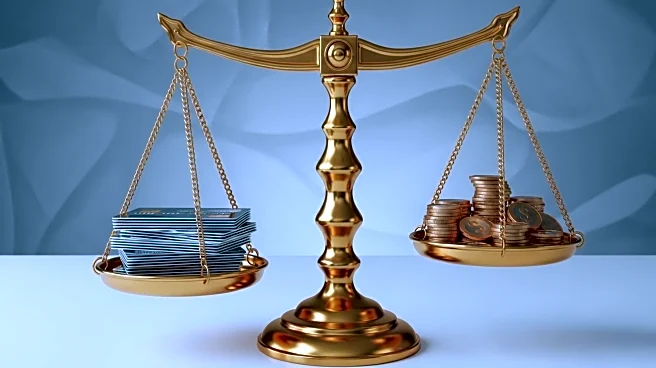What is the story about?
What's Happening?
Consumer Reports has provided guidance for individuals struggling with credit card debt, a growing issue as Americans collectively owe $1.21 trillion. The average household balance is approximately $6,000, with many cards carrying interest rates above 20%. Lisa Gill from Consumer Reports suggests pausing credit card usage and reducing monthly expenses to manage debt effectively. She advises prioritizing payments on cards with the highest interest rates to save money in the long run. For those with good credit scores, transferring high-interest balances to cards offering 0% interest for an introductory period can be beneficial, provided the debt is paid off before the regular interest rates resume. Adjusting payment dates to coincide with paydays and setting up automatic payments can help avoid late fees. Gill also recommends contacting credit card companies to negotiate lower interest rates or inquire about hardship plans, which may offer temporary relief. Additionally, reputable nonprofit credit counseling agencies can assist in consolidating debt into manageable monthly payments.
Why It's Important?
The advice from Consumer Reports is crucial as credit card debt continues to be a significant financial burden for many American families. High interest rates can make it difficult to reduce debt, leading to long-term financial stress. By implementing strategies such as prioritizing high-interest debt and utilizing nonprofit credit counseling services, individuals can potentially save thousands in interest and pay off debt more efficiently. This guidance is particularly relevant as economic conditions fluctuate, impacting household incomes and expenses. The ability to manage debt effectively can improve financial stability and reduce stress, contributing to overall economic health.
What's Next?
Individuals struggling with credit card debt may consider reaching out to credit card companies to negotiate better terms or explore nonprofit credit counseling services for debt consolidation. As economic conditions evolve, there may be further opportunities for consumers to manage their debt through new financial products or services. Monitoring financial health regularly and adjusting strategies as needed will be essential for those seeking to reduce their debt burden.
Beyond the Headlines
The broader implications of managing credit card debt effectively include potential improvements in credit scores over time, which can lead to better financial opportunities such as lower interest rates on loans and mortgages. Additionally, reducing debt can alleviate stress and improve mental health, contributing to a better quality of life. The emphasis on financial literacy and responsible credit usage may also encourage more sustainable economic practices among consumers.
















